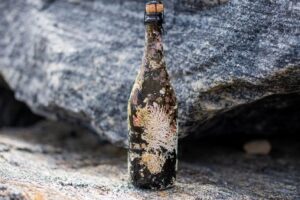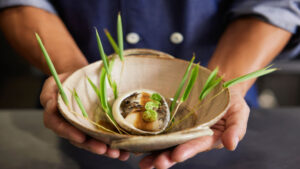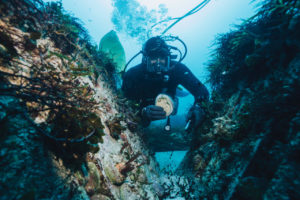Growth and green credentials at core of rare opportunity

Pic: Rare Foods Australia
Backed by world-leading innovations and sustainability credentials, an under-the-radar company on WA’s South-West corner is shipping record quantities of its premium products to expanding global markets.
Rare Foods Australia already supplies more than 20% of international demand for wild caught greenlip abalone – a top-of-the-range seafood offering sought-after by high-end restaurants across Asia and beyond.
Now the company is expanding its core business while adding to its range of products that fulfil increasing global demand for top quality and ethically produced food.
So far this year staff numbers at Rare Foods Australia’s (ASX:RFA) Augusta operations have grown by 31% as the company achieves record sales and revenue. More of those results are on the way, with existing YTD sales and forward non-binding orders exceeding FY22 sales (up 9% year to date). Looking beyond this year, a savvy sales strategy is growing client numbers in both traditional and new markets.
Wild origins
It all started when local third-generation fisherman and former professional abalone diver Brad Adams noticed wild abalone stocks declining and, as a consequence, fishing quotas tightening.
To boost abalone numbers in the pristine waters off Augusta and continue a reliable supply for export markets, Brad developed, with the help of some partners, RFA’s specially designed artificial reefs, or ABITATs.
Since the concept of placing juvenile abalone onto the reefs was commercialised in 2014 RFA has added 10,000 ABITATs to its 413ha ocean lease area, the equivalent of 20km of reef.
Nothing like Rare Food’s ABITATs are known to be used commercially anywhere else in the world and the efforts that went into their development is now paying off.
Sustainability Heroes
This year Brad was named Sustainable Fishing Hero in the prestigious and internationally recognised Marine Stewardship Council (MSC) Sustainable Seafood Awards for his commitment innovation and ensuring a healthy fishery for the future.
RFA’s method of “sea ranching” abalone has additionally earned Rare Foods Australia MSC accreditation along with the right to use on its products the “blue fish tick” – a globally acknowledged sign that the seafood is sustainably grown.
Now a director of RFA Brad says he continues to love diving and seeing the regenerative benefits of the company’s practices.
“We have created an amazing, complex ecosystem that adds to the diversity of the marine park we operate in. I love observing the wide variety of marine life that either visit the reef or call it home, including a variety of indigenous fish, turtles, whales and seals.”
Master plans
Rare Foods is now both generating and fulfilling increasing demand from its network of Master Distributors who supply wholesalers, which in turn service upmarket restaurants.
Given its opportunities to expand the ranch and processing facility further, the company is growing its client base in new regions while meeting increasing demand from traditional markets.
In recent months RFA was invited to join the Great Australian Seafood exhibit at the major Seafood Expo North America, held in Boston. This has led to new relationships with major importers in both Canada and the US.
On 1 June, the Free Trade Agreement between Britain and Australia came into effect which made RFA’s products better value and has already generated an increase of enquiries on larger shipments.
Closer to home, RFA has been working with India’s premium frozen seafood importer to get its first shipment of Australian abalone to top-tier clientele in what is now the world’s most populous nation.
In the more traditional Asian markets, RFA is already seeing very strong interest for Chinese New Year orders for next February as Hong Kong, Macau and Taiwan plan for big Year of the Dragon celebrations.
The company has just achieved record post Chinese New Year sales of 19.2 tonnes of ranched wild greenlip and Wild Origin abalone following 2022 festivities, bringing revenue to $3.9 million YTD as at the end of March.
And as Australia’s trade relationship with China seems to be getting back on track again there are more enquiries than ever from multiple major mainland capital cities.
At the same time RFA is seeking businesses and assets aligned with its premium and sustainable brand for merger and acquisition opportunities.
Growing out from strong core
As consumers increasingly demand clean and ethically grown food, RFA is using its expertise to build its greenlip abalone biomass and harvest volumes.
A bi-annual assessment of the sea ranch biomass ahead of the most recent quarterly report (March 2023) valued it at $8.8 million, up 16% on the previous six months. This was thanks to reduced costs for harvest, process and distribute (-23%) and higher average sales prices (+9%).
The operations are also supported by a rigorous research and development program focused on improving juvenile survival rates and maximising the harvest from the artificial reefs.
Those efforts are paying off, with reefs now producing abalone averaging 224 grams, a 4% lift on the average size in FY22.
Broadening the menu
The company is adding to its range by marketing wild-caught roei abalone via a successful collaboration with local quota holders.
RFA has also secured a continuous weekly supply of third-party product to generate additional revenue.
This was enabled by an expansion of its processing capacity, which resulted in a record total of 36 tonnes despatched from the Augusta facility last Quarter.
In line with its culture of innovation and realising the potential of its lease – one of only two in WA allowing use of the sea floor – RFA is now leading Australia in the ocean-cellaring of wines.
This involves placing wines from the local Margaret River region on its ocean floor to be matured by the ocean currents, in an atmosphere with consistent light, pressure and temperature – a method now used by some leading European wineries.
To showcase its innovations, RFA earlier this year opened its Ocean Pantry cafe and retail outlet. This runs popular tours of its operations at the Augusta Marina and offers hospitality to the hundreds of thousands of annual visitors who visit the area for its stunning natural environment and whale watching.
This article was developed in collaboration with Rare Foods Australia, a Stockhead advertiser at the time of publishing.
This article does not constitute financial product advice. You should consider obtaining independent advice before making any financial decisions.
Related Topics

UNLOCK INSIGHTS
Discover the untold stories of emerging ASX stocks.
Daily news and expert analysis, it's free to subscribe.
By proceeding, you confirm you understand that we handle personal information in accordance with our Privacy Policy.








